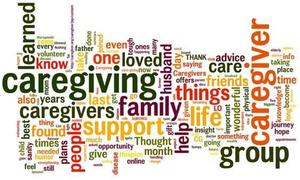Goal: meaningful connections, sharing caregiving responsibilities, and developing community-based solutions.
You are here
The mythology of caregiver technology's non-adoption
 Pundits perpetuate the myth of non-use of so-called caregiver technology. According to AARP, 40 million caregivers are taking care of an older, sicker person -- so says an oft-quoted 2013 AARP Public Policy Report statistic. A different AARP/Catalyst 2016 survey asserts only 7% of these caregivers use technology to help them. What is the 'technology' they won't use? And what is the theory as to why they won’t? Says Jeff Makowka of AARP: "Since many such caregivers also hold down regular jobs, they simply don’t have time to try some new technology." But if they’re working (or of working age), three-fourths of them have smartphones. And given the data-hogging nature of smartphones, all are fairly new. But wait, he also cited an example of an Amazon Echo as deployed for a family member with dementia -- enabling endless repetition of questions like 'What time is it?' etc. Okay, we have to ask, is the Echo a 'caregiving technology?'
Pundits perpetuate the myth of non-use of so-called caregiver technology. According to AARP, 40 million caregivers are taking care of an older, sicker person -- so says an oft-quoted 2013 AARP Public Policy Report statistic. A different AARP/Catalyst 2016 survey asserts only 7% of these caregivers use technology to help them. What is the 'technology' they won't use? And what is the theory as to why they won’t? Says Jeff Makowka of AARP: "Since many such caregivers also hold down regular jobs, they simply don’t have time to try some new technology." But if they’re working (or of working age), three-fourths of them have smartphones. And given the data-hogging nature of smartphones, all are fairly new. But wait, he also cited an example of an Amazon Echo as deployed for a family member with dementia -- enabling endless repetition of questions like 'What time is it?' etc. Okay, we have to ask, is the Echo a 'caregiving technology?'
Does a technology survey recognize common technology used by caregivers? So let’s presume that a family member of an older adult is the responsible party for that person’s care. According to a recent survey by Caring.com, fewer than 6% are sold on technology to help them with tasks, including "shop for groceries, manage finances, and get personal transportation from anywhere to anywhere –- all from your computer or smartphone." Note in that linked chart that 25% who live separately from a care recipient indicated use of a Personal Emergency Response System (PERS). But apparently that is not a 'caregiving' technology, also described by Caring.com as an app. One imagines that vendors in the $3 billion PERS market would disagree that an app and a technology are synonymous -- and perhaps they would also note that in their businesses, like Philips, they market an app.
Was the survey respondent an Amazon Echo user? Who would know since that was not a choice? In fact, the intersection of caregiver and Echo buyer universe may populate a future Venn diagram. The Amazon Echo does not fit within caregiving technology categories, opines AARP’s report on Caregiving Technology Frontiers. Some in the media refer to it as a smart speaker or part of a smart home or maybe IoT or a voice assistant. But the reality is that it exists and has transformed the tech landscape -- and not simply in its own widening ecosystem. And would a survey questioner know that the Amazon Echo software is enabled on five devices or that interface hardware exists -- such as LifePod -- activated by voice to prompt the device with person-specific customized guidance to older adults? Consider Orbita Health’s Lenovo demonstration: "Alexa, when should I take my meds?"
The health technology mega-market includes, but should not target, caregivers. Family and professional caregivers are harmed by the narrow-casting questions, simplistic surveys, examples and continuous repetition about non-adoption. Worse, these conclusions confuse the tech vendors and drives them to miss the meaning of the larger picture about tech adoption. In fact, as Pew's Tech Adoption of Boomers (and Everyone Else) slides note, 83% of younger boomers aged 51-59, the prime age of caregivers for the elderly, are Internet users, 59% are smartphone users, 66% have broadband at home, and 52% use Facebook. [Rant off.]

Comments
Mythology Posting 4.5.17
Well stated. Thank you. To what do you attribute the "mythmaking" on the part of AARP? I recall their Healthy@Home 2.0 findings were pretty negative too. Are they truly reflecting their membership, or does AARP have a technology platform of their own?
AARP technology tools
The AARP material cited was from surveys.
Here are two links to their tools:
https://www.aarp.org/caregiving/caregiving-tools/
https://careconnection.aarp.org/en/home.html